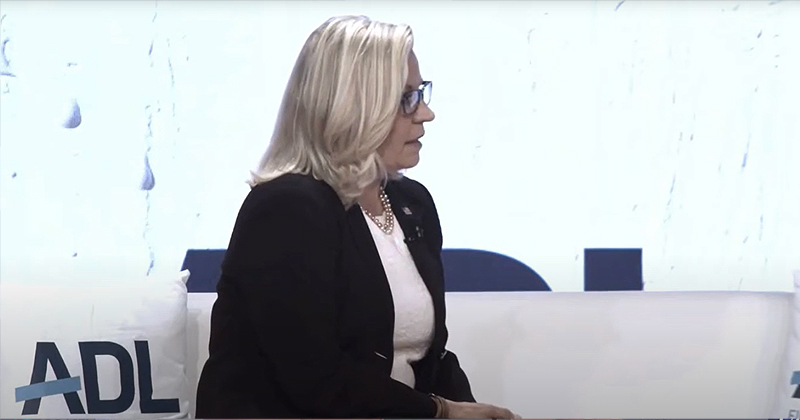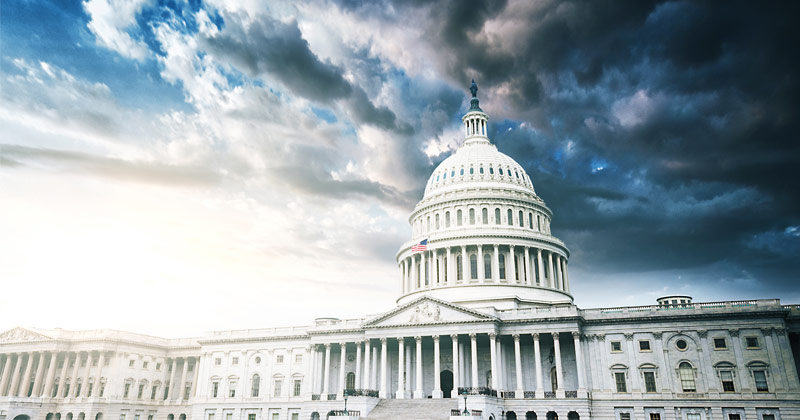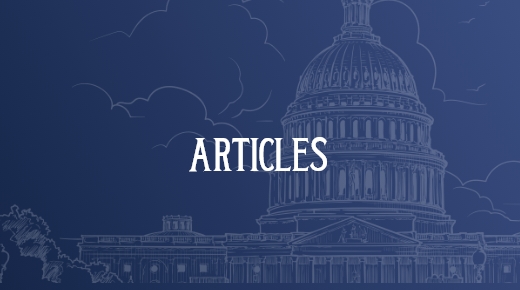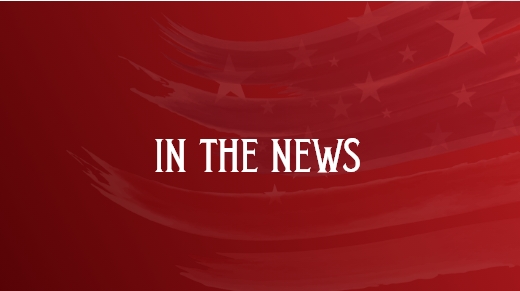
Cheney At ADL: It’s Our Duty And Obligation As Humans And Americans To Fight Antisemitism
New York, NY– Last night, Liz Cheney spoke at the Anti-Defamation League’s “Never Is Now” Summit at the Javits Center which is the world’s largest annual summit on antisemitism and hate. In addition to answering a question about Tuesday night’s election result, she spoke at length about the importance of combatting antisemitism and getting away from the toxicity and vitriol that is too prevalent in politics today.
Watch her full conversation here and see a complete transcript below:
ABIGAIL POGREBIN: We had a little false start there. We keep you on your toes here. Welcome. I just want to – full disclosure – you let me call you, Liz. So I don’t want people to think I’m not being respectful, I know we promised not to grill you on the election results, but let’s talk about the election results. I would be derelict in my duty as your interlocutor to sit across from Representative Liz Cheney and not ask, what’s your take, what’s your reaction, as we say, in Judaism, on one foot, two days after Tuesday?
CONGRESSWOMAN LIZ CHENEY: Well, I think that it was a clear victory for Team Normal. And, we have a huge amount of work to do, but I think that you saw in really important races around the country people coming together to say we believe in democracy, we believe in standing up for the Constitution and for the Republic, and a real rejection of the toxicity and the hate and the vitriol and of Donald Trump.
POGREBIN: And before we leave it, you campaigned for three Democrats, two of which won – am I right about that? And that’s something that maybe in my lifetime, I didn’t expect to see.
CONGRESSWOMAN CHENEY: Yeah, mine either.
POGREBIN: But just to kind of on a serious note, talk about what used to sound kind of almost like sloganeering and utopian, this idea of crossing the aisle, this idea of civility across party lines. Watching you on the Committee and watching you now on the election on the campaign stump, what is the reality of those who you have been able to work with? Like, give us a taste of the world as it could be?
CONGRESSWOMAN CHENEY: Yeah, I mean, look, I think that the changes that we’re seeing in terms of bipartisanship on behalf of the Constitution, for example, in terms of my campaigning for some of my colleagues who happen to be Democrats reflects the challenges and the threats that we’re facing as a nation. And I think that, for me as well as for my colleagues on the other side of the aisle, there’s just been a real recognition of, we don’t minimize our policy disagreements. We absolutely have policy disagreements, but we recognize that there’s something much bigger and more at stake, and that we have to come together and stand for fundamental democratic principles, stand for the rule of law. And that, in order to defeat the anti-democratic forces at work in our country today, it’s going to require a level of bipartisanship that you might not have seen otherwise. And my colleagues and I on the Select Committee joke with each other and say that we look forward to the days when we can get back to disagreeing, because that will tell us that our politics have righted themselves.
POGREBIN: I’m glad to hear that you guys have something to joke about occasionally.
CONGRESSWOMAN CHENEY: We spend a lot of hours together.
POGREBIN: So let’s turn to the focus of this important summit, the disturbing rise in antisemitism, hate speech and hate crimes in this country. How do you diagnose what’s contributed to the climate right now? And what specifically is giving it oxygen?
CONGRESSWOMAN CHENEY: You know, I think there are many things. But I think that toleration of the hate speech, acceptance of the hate speech, is one of the most important and dangerous things that I see happening. And, you know, I look at it, one data point or one experience, if you look at how the Republican Leadership – and I was then in Republican Leadership – look at how we handled the example of Representative Steve King. When he made comments that were white nationalist, we immediately stripped him of his committees, we immediately said this is not acceptable. We said he needed to find another line of work, this is not something that is acceptable within the Republican Conference. That was two years ago, three years ago, now. It was the beginning of 2018, I believe. 2019. And, if you compare that to how members of the Republican Conference today who have expressed openly antisemitic views – people like Marjorie Taylor Greene and Paul Goasr who have attended white supremacist conferences – and they are, in fact, being heralded and playing a much more prominent role. And so I think that what we know from history is that you cannot tolerate hate speech and in particular, you cannot tolerate antisemitism. I think about it – both parties talk about that we need to be a big tent. And that’s right. But we also, on both sides, need to be able to say there are some views that must never be in the tent. There are some views that cannot be accepted. And I think that’s critically important.
POGREBIN: So you brought up Marjorie Taylor Greene. She obviously talked about Jewish space lasers and compared President Biden to Hitler. And, Scott Perry compared political opponents to Nazis. Then on the other side, Rashida Tlaib said no one can have progressive values and support what she called an apartheid government in Israel. Ilhan Omar, I don’t have to necessarily reiterate some of her comments. So this is a sort of bipartisan moment. What do you make of just where Congress is in this landscape? And what is, other than stripping people of their roles in Congress, what is the best way to address that?
CONGRESSWOMAN CHENEY: Look, I think as you point out, both parties have had situations that they have not dealt with the way they should have. When Ilhan Omar made comments that were clearly antisemitic, we worked to put a resolution on the floor of the House to condemn those comments. And the resolution that ultimately was put on the floor didn’t even specifically mention her comments, because it was a very broad condemnation of hate speech. So I think that individuals have obligations, individuals have responsibilities, political leaders have responsibility, in particular, to recognize that what is accepted and what is tolerated, then becomes the norm. And, we know as a society, we know through the study of history, that what begins as words becomes far worse. And we have a duty and an obligation, particularly with respect to antisemitism, to make sure that we stand against it, and that we all demand of our elected leaders, no tolerance.
POGREBIN: And, just because you mentioned that hate resolution, which – I’m just some quoting you – you call it a ‘sham’ and you said it did not address the issue that is front and center. And some of your colleagues, quote, ‘can’t even muster the courage to stand up to blatant antisemitism.’ What’s the problem?
CONGRESSWOMAN CHENEY: I think that there are a number of issues. And I think, in a way, you have to separate out sort of the individual political circumstances and how the leaders on each side dealt with these issues and continue to – but I think that it’s important to take a big step back and to recognize, as as ADL has been so effective at doing, the rise in antisemitism around the world. The rise in violent incidents connected to antisemitism. The rise in antisemitic statements by celebrities and others. And when you have a member of Congress who puts on a Star of David and says that she is being persecuted because she, you know, has been somehow being forced to be tested for COVID or vaccinated against COVID snd compares that to the Holocaust, we all as a society ought to be able to say that person does not belong in Congress. But it takes all of our voices and individual responsibility to stand up against that.
POGREBIN: After the Buffalo supermarket shooting that was so horrific last May, you tweeted, ‘history has taught us that what begins with words ends in far worse.’ You just reiterated that here. I just want to talk about the importance of words, because I’m sure you hear, as many of us do, that sometimes it can sound alarmist to get exercised about a tweet or remark until we see what words can set in motion. How would you kind of in a way elevate the urgency of our discourse and something that might be considered casual?
CONGRESSWOMAN CHENEY: Yeah, I mean, I think that there, you have several different issues that we need to address and one is just the level of toxicity and vitriol in our politics. And, I readily admit that I am somebody who has been very partisan. I’ve surely tweeted things against members —
POGREBIN: You’ve been partisan? Oh my God.
CONGRESSWOMAN CHENEY: I know, it’s hard to believe.
POGREBIN: That’s going to make news.
CONGRESSWOMAN CHENEY: That’s right. But I do think in this current moment, we certainly need to recognize that we have seen violence. And we’ve seen, in our Capitol building, what can happen when people are incited, when people are lied to. And so there’s certainly a level of – we all need to step back from the toxicity. But I also think that it is really important not to just sort of say, well, we all need to be nicer to each other, which we do. But we need to recognize the very clear and specific danger of antisemitism. And, when my dad was Vice President, we went to Auschwitz for the 60th anniversary of the liberation of the camp. And one of my daughters was 10 years-old at the time, and she came with us. And we were sitting in the theater in Krakow – they had a ceremony at the theater before we went to the camp. And there were survivors of the camp in the theater. And one of – there was a woman who came across the theater, she saw my daughter and me sitting there, and she came across the theater and she said to my daughter, ‘how old are you?’ And my daughter said, ‘I’m 10.’ And she pulled out of her purse, a picture of little children in the striped uniform of Auschwitz, and she showed it to my daughter, and she said to her, ‘that’s me when I was 10 years-old.’ And I think that recognizing that the Holocaust was not that long ago, recognizing the particular and special burden that we have to fight antisemitism is incumbent on all of us. And I think it requires holding our elected officials to account.
POGREBIN: ADL has a consistent charge to all of us, not just at this conference but all year long, to summon our courage and fortitude despite the slings and arrows that might come out. And, you’ve had a lot of experience with slings and arrows and you’ve paid a high cost for choosing principal over popularity. I won’t go into what you’ve lost, but it is unusual that someone stays the course despite those losses. So I would like to ask you as a really genuine question, how do you answer those who question whether the risk is going to be worth it when it might mean getting sidelined, losing friendships, jobs, actual security – which I think is more real than we – certainly in my lifetime, not feeling safe to stand alone? How do you help us say it’s worth the risk?
CONGRESSWOMAN CHENEY: Well, I think, first of all, to me it’s not courage, it’s duty. It is an obligation to the Constitution. You know, the people who stormed the beaches at Normandy, the people who liberated the camps, the people who put their lives truly on the line, that’s courage. And, I got a message from a Gold Star father a couple of months after January 6, and he said to me, ‘standing up for truth, honors all who gave all.’ And that’s something that we all have to remember. But we also, as we think about the people that were casting votes for, you know, I’ve been especially struck over the last year and a half – I’ve had a number of occasions to do things like go back and look at the Federalist Papers to understand what the Founders thought and said and told us and, you know, they understood very clearly the potential danger of faction. They did things like talk about not having the Electoral College meet at the center of government because they didn’t want the political pressure. They knew it’d be difficult to withstand. And I think that anybody who is in one of these jobs simply to sit in the seat, shouldn’t be in the job. And there’s a reason why we swear an oath to the Constitution, and it has to mean something. And it has surprised me that it doesn’t mean something to more people. But again, I mean I look at what happened on Tuesday night, and while it certainly is not the end of this battle – we have a long battle ahead – I do think it was the American people generally sending a message, they want to pull us back from the brink. They don’t want this nation to go over the edge, to go into the abyss. And we have to make sure that the incentives are there to elect the kind of people who are going to make sure that they’re part of the solution.
POGREBIN: As we run out of time, I just want to talk about a ploy that I think we’ve seen used against you in your efforts to protect democracy that’s also, in a way, can be an overlay with those who call out antisemitism. And that is this sense of like enough already. You keep talking about January 6th, you keep talking about election denial. The fact that democracy is fragile and we have to protect it. There’s almost this sense of, they’re playing into kind of the glut of news and the same kind of language to the point where they can almost say, ‘aren’t we all tired of it? Can’t you give it a rest?’ And I think that our charge is that we can’t.
CONGRESSWOMAN CHENEY: Right.
POGREBIN: But again, for those of us who are not in Congress, and maybe aren’t putting ourselves on the line in that way, just how do you still kind of refuse to be exhausted?
CONGRESSWOMAN CHENEY: You know, well, I am exhausted, sometimes. I have five kids. No, you know, there’s a wonderful book that I recommend to people called “Lincoln On The Verge” about Abraham Lincoln’s train trip from Springfield to Washington, DC in 1861. And, Ted Widmer, who’s the author of the book, describes Lincoln. And he says, he really actually believed in the promise of our founding documents, he really believed it, and that made him dangerous. It made him dangerous to all of the cynical politicians who didn’t really believe. And, I think that every one of us has to vow that we are going to be dangerous, we are going to stand up for what we believe in. And, it doesn’t matter if people try to shout you down, or try to tell you to be quiet, and that they’re tired of it. We can never be tired of defending the Republic, we can never be tired of fighting against antisemitism, we just don’t have the luxury to say, ‘alright, we’re not going to fight that fight,’ because it’s our fundamental duty and obligation as humans and as Americans.
POGREBIN: So finally, I’m sure it won’t surprise you that many of my Democratic friends say ‘I used to disagree with Liz Cheney on pretty much everything.’
CONGRESSWOMAN CHENEY: I’ve heard that.
POGREBIN: ‘For now, she’s become one of my heroes.’ And that’s not a place I’m sure you thought you’d be. So, just because I get to sit with you for a second on a white couch, tell me what that feels like to just have really that reaction to what you’ve done even if you’re out of a job.
CONGRESSWOMAN CHENEY: You know, it’s an incredibly moving thing. And when I talk to people – and I have to say it’s especially moving when I talk to young women – but to be in a position where we can acknowledge that we have those differences, but recognizing there’s a fundamentally bigger issue. And I’m especially moved – I have daughters, I have three daughters and two sons – and especially moved, it’s very emotional when, you know, the young women who come up to me – and, by the way, the young people who turned out to vote on Tuesday, I mean that —
POGREBIN: Gamechanging
CONGRESSWOMAN CHENEY: Yes. I’ve been on a lot of college campuses in the last year and a half. And when I talk to young people, there’s just a sense of – and they will say to me, we don’t agree with you on anything, but we want to fight for the Constitution with you – and I think that watching young people understand how much power individuals have. I also want to say the individuals who have testified in front of the Committee, and especially the young women who have had such incredible bravery – people like Cassidy, Hutchinson and Sarah Matthews – who stood in the face of tremendous threats and pressure that their older, mostly male colleagues, wouldn’t stand up to. That just gives me such hope for the country.
POGREBIN: Well this is a really private safe space if you want to tell us you’re running for President. Thank you. Thank you all. Thank you.
CONGRESSWOMAN CHENEY: Thank you very much.




